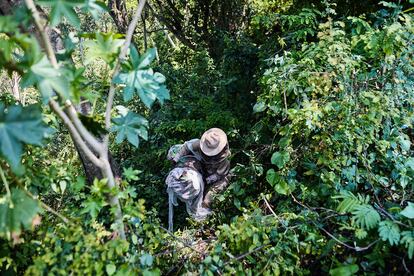It is six in the morning and dawn is breaking in Mugunga, 10 minutes from the center of Goma, in the east of the Democratic Republic of the Congo. Isaac Habyarimana helps Esther Habyarimana finish putting on her suit. Father and daughter work in beekeeping in this paradise of valleys and forests. No one would say that, less than 10 kilometers away, a war is happening.
Isaac Habyarimana, 54, began practicing beekeeping at the age of 12. He began studying Biology, until the war intervened in 1996: the rebel group led by Laurent Desiré Kabila occupied Masisi, his city. They wanted to recruit him, he says, and he escaped. He decided to go to Goma, the capital of North Kivu, considered one of the most biodiverse regions in the world, home to swamps, lava plains, savannas, hippos and mountain gorillas. Also coltan, one of the minerals most desired by the technology industry, of which the Democratic Republic of the Congo has the 80% of world reservesNorth Kivu is the most fertile area.
The Democratic Republic of Congo has been plagued by fighting between at least 122 rebel groups for control of the country’s unstable eastern provinces and their mineral wealth for more than 25 years. The internal displacement crisis in the Central African country is one of the most serious in Africa, with more than 1,000 people living in the region. six millions of people affected, according to the United Nations. And the re-emergence of the Rwandan-backed M23 rebel group in November has worsened the already dire humanitarian and security situation in eastern DRC. “The war pursues us,” Isaac Habyarimana huffs.
The country’s crisis is not just humanitarian, it is also environmental, due to mining and deforestation. If the current rate continues, 27% of the tropical forests in the Congo Basin will disappear by 2050, according to the Center for International Forestry Research.
“We have been at war for a long time and destroying our environment,” emphasizes Esther Habyarimana, 20 years old, and one of Isaac’s four daughters. “A solution that we civilians have at hand to save our region is nature. “We must protect it and regenerate it.” Four years ago she started beekeeping and set up her own business: 10 honeycombs that can provide up to five liters of honey each, and that she can sell for 10 dollars (9.2 euros) per liter. Beekeeping also changed the life of her father before, who, when he arrived in Goma as a displaced person, dedicated himself to repairing houses and then to agriculture. “It was a very hard job that didn’t give me any money,” recalls Isaac Habyarimana. In the Democratic Republic of the Congo, where two-thirds of its almost 100 million inhabitants live on $2.15 a day, according to the world Bankhe 70% of the population He works in agriculture. “After a long time, I was able to buy my plot. It allows me to earn more money in a job with better conditions. I started in 2015 with five hives; today I manage 150 and can sell up to 80 liters of honey. Providing education and access to health care for my children and my wife is what I always dreamed of, and I was able to achieve it,” he says proudly.

The impact of beekeeping is not limited to the economic. Pollination is vital for the growth of plants and trees, which has an impact on reforestation, agriculture and the growth of fruits and vegetables. “Bees pollinate 80% of plants, and the money that beekeepers make encourages them to protect the environment in their private lives as well. It’s a virtuous circle,” explains Luc Kavuba, Project Manager at RACOD, a local NGO.
Isaac Habyarimana opens the doors to the honeycombs, squats down and places his hand on the ground. The bees surround him. “They don’t sting me!” he shouts. He continues: “You have to give love to the bees, so they give the same back.” He points to a hollow, empty log, the traditional type of honeycomb. “But with these new box-shaped honeycombs with internal divisions, we can produce more than double. Since this year we have been trying to work with modern tools,” he stresses. He would like to achieve that each honeycomb produces the maximum possible, 14 or 16 liters of honey.
Every day, Isaac Habyarimana goes into the forest to find at least two colonies of bees, each made up of 20,000 insects. He captures the queen so that the rest can follow her, puts them in a bag and then in the honeycombs. The whole process can take up to 12 hours. Habyarimana spends all day on beekeeping, while his daughter works only part-time, because she studies economics at the University of Goma. “I am young, but I do not want to leave my country,” says Esther Habyarimana. “With the tools I am acquiring from my studies, I intend to lead sales in North Kivu and throughout the DRC and then be able to export,” she says, as her father looks on proudly.
You can follow Future Planet in X,
Facebook, Instagram and TikTok and subscribe here to our newsletter.
#bees #bullets #beekeeping #creates #life #margins #war #Democratic #Republic #Congo
